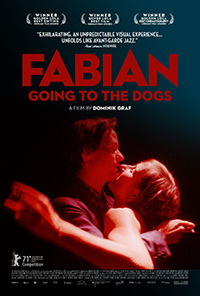The Dog Days Aren’t Over: Graf Puts a New Coat of Paint on the Weimar Republic
 The Weimar Republic, aka the German Republic, which lasted from 1918 to 1933, is one of the most romanticized periods of a cultural renaissance in literature or cinema. Josef von Sternberg’s The Blue Angel (1930) heralded the rise of Marlene Dietrich, while Christopher Isherwood’s experiences resulted in his Berlin Stories (1945), which gave us the penultimate Cabaret (1972). But this period of chaotic excesses, Germany’s “Golden Twenties,” which mirrored the hedonistic onslaught across the Atlantic with America’s own Roaring Twenties, of course came crashing down into one of the darkest chapters of world history as the Nazi party and Adolf Hitler forever changed our conception of modern man’s capability for hatred and penchant for cruelty.
The Weimar Republic, aka the German Republic, which lasted from 1918 to 1933, is one of the most romanticized periods of a cultural renaissance in literature or cinema. Josef von Sternberg’s The Blue Angel (1930) heralded the rise of Marlene Dietrich, while Christopher Isherwood’s experiences resulted in his Berlin Stories (1945), which gave us the penultimate Cabaret (1972). But this period of chaotic excesses, Germany’s “Golden Twenties,” which mirrored the hedonistic onslaught across the Atlantic with America’s own Roaring Twenties, of course came crashing down into one of the darkest chapters of world history as the Nazi party and Adolf Hitler forever changed our conception of modern man’s capability for hatred and penchant for cruelty.
The ripple effects of this period still reverberate, but what of this brief, illuminating period right before the onset of doom? These five minutes to midnight generated some of German literature’s most noted authors, such as Alfred Doblin and his seminal 1929 text Berlin Alexanderplatz. One of Doblin’s many counterparts was Erich Kastner, best known as a children’s author (and whose original novel provided the basis for the hit US property The Parent Trap). But Kastner’s obscure 1931 novel Going to the Dogs: The Story of a Moralist gets a bizarre retrofit from Berlin School filmmaker Dominik Graf in his first theatrical narrative since 2014 with Fabian – Going to the Dogs. An ambitious remounting of Kastner’s text, it’s an uneasy calm before a wrathful storm textured curiously so as to blur the line between a past which was never rightly put to rest and the present which seems to be mirroring it.
It’s Berlin, 1931. The metropolis teems and seethes with possibility and expectation, particularly in a nightlife scene which would create nostalgic reconstructions generations later. Aspiring writer Jakob Fabian (Tom Schilling) has moved to the city from Dresden, where his parents run a small shop. Writing advertising copy by day and frequenting a plethora of brothels at night alongside his friend Stephen Labude (Albrecht Schuch), Fabian seems destined to float between lovers. One such acquaintance, Irene Moll (Meret Becker) will establish her own brothel of male sex workers, attempting to recruit Fabian amongst her staff. But a chance meeting with Cornelia (Saskia Rosendahl) finds him falling head over heels in love…until success as an actress forces an immediate wedge between them.
Tom Schilling officially becomes the go-to persona for hipster artistic types struggling to rise above bohemian trappings which have become compulsory. His presence as Jakob Fabian is at least comparable to his breakout in the laidback, hyper stylized 2012 arthouse comedy A Coffee in Berlin from Jan-Ole Gerster as well as his turn as artist Kurt Barnert in the Oscar nominated Never Look Away (2018). He’s reunited with Rosendahl, his co-star from Never Look Away, and they share an easygoing chemistry, who together may not feel as impassioned as they exude comfortable camaraderie. Graf, through various notable television projects (including contributing to the noted 2011 omnibus Dreileben) knows a thing or two about period pieces judging from his handsome 2014 title Beloved Sisters, so his choices in Fabian, while jarring, are always purposeful and pointed.
Initially, the narrative begins on a frenetic note, with Fabian dipping in and out of smoke-filled brothels, commiserating with bestie Labude, who is pursuing his thesis while extolling the virtues of communism and bedding every woman he can get his hands on. At turns droll and ludicrous, Fabian settles into an even keel when he meets aspiring actress Cornelia, who eventually is more in love with fame than Fabian. It’s Theodore Dreiser, W. Somerset Maugham and A Star is Born all wrapped up in one heady romantic letdown.
If Doblin’s Berlin Alexanderplatz (famously adapted by Rainer Werner Fassbinder in 1980 and then updated for contemporary cross-cultural climes in 2020 by Burhan Qurbani) has hardboiled noir elements, Kastner’s semi-autobiographical snapshot of the late 1920s feels much darker, more mournful. Ninety years later, Graf punches up the Nazi element flourishing all around the naïve German denizens (which Fassbinder also assuredly injected in his mounting of Doblin), and brings us to a literal inferno (after all, isn’t it a pleasure to burn?).
Lensed by Hanno Lentz (a favorite of Doris Dorrie, and who also served as cinematographer on David Wnendt’s Look Who’s Back, 2015), there’s a decidedly modern look to Fabian which hardly belies 1931, driving home the message of how human behaviors and politics are virtually the same, only our technological advances have allowed for faster mutations of our worst behaviors. With a running time of three hours, Graf perhaps spins his wheels too long trying to maintain an alliance with Kastner’s prose, but the saga of these two drifting lovers eventually stagnates. Ultimately, neither Fabian nor Cornelia are exactly empathetic characterizations. Neither has the willpower to advocate for themselves or each other, and so, like men and women of straw, eventually are easy to burn.
Reviewed on March 1st at the 2021 (virtual edition) Berlin International Film Festival – Main Competition. 176 Mins.
★★★/☆☆☆☆☆


